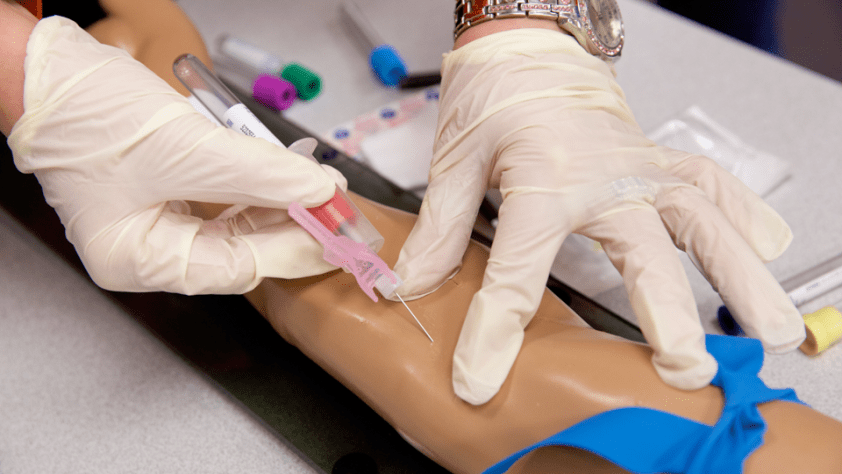The Path to Accreditation: Comprehending the Phlebotomy Educating Program Trip and Its Significance
As you take into consideration the course to qualification in phlebotomy, it is very important to understand the role you'll play in healthcare. Your training will cover important skills, from blood collection techniques to patient interaction. Each component of the program prepares you for the challenges ahead. But what exactly does the journey entail, and why is certification so important for your future profession? Allow's check out these concerns additionally.

The Role of Phlebotomists in Healthcare
Phlebotomists play a crucial function in the medical care system, functioning as the essential web link between people and vital diagnostic testing. You'll perform blood draws, ensuring samples are accumulated precisely and securely. Your experience assists in diagnosing clinical conditions, monitoring wellness, and guiding treatment choices.
In your daily communications, you'll need to establish trust with individuals, making them really feel comfortable throughout what could be a difficult experience. You're liable for labeling and managing examples very carefully to stop contamination or mistakes, which could impact examination results.
Beyond this, you'll usually work together with medical professionals and registered nurses, interacting important details about individuals' problems. Your duty is fundamental in maintaining the workflow in health care setups, ensuring timely and accurate results. By grasping your skills, you add meaningfully to person treatment, making you an indispensable part of the medical team. Accepting this obligation is vital to your success as a phlebotomist.
Review of Phlebotomy Training Programs
When discovering phlebotomy training programs, you'll discover different types developed to fit different schedules and finding out designs. Each program assists you establish vital skills like blood collection and individual interaction. Recognizing these choices is crucial to selecting the right course for your occupation.
Sorts Of Educating Programs
Several kinds of training programs are readily available for those looking to end up being proficient in phlebotomy. Furthermore, some hospitals and centers supply on-the-job training programs, giving functional experience while you discover. Whatever path you select, each program aims to furnish you with the necessary skills for an effective phlebotomy profession.

Secret Abilities Created
Mastering phlebotomy requires a set of essential skills that are established with detailed training programs. You'll find out technical skills like proper vein selection, needle insertion, and blood collection strategies. These hands-on techniques guarantee you can carry out procedures safely and effectively. Furthermore, communication skills are fundamental; you'll require to engage with individuals, describe treatments, and put them at simplicity. Comprehending composition and physiology is vital, as well, as it helps you locate veins and understand the body's response to blood attracts. Lastly, you'll get knowledge of safety and security methods and infection control, guaranteeing you preserve a sterile setting. Each of these abilities is necessary for your success as a licensed phlebotomist, making you an important asset in any kind of health care setting.
Key Parts of a Phlebotomy Course
In a phlebotomy program, you'll concentrate on vital topics that lay the groundwork for your future career. You'll participate in hands-on training that permits you to apply what you've found out in real-world settings. Both the curriculum and practical experience are important for your success as a phlebotomist.
Curriculum Summary
While seeking a phlebotomy training program, you'll encounter a curriculum designed to furnish you with essential abilities and knowledge. Phlebotomy school. This educational program usually consists of makeup and physiology, focusing on the circulatory system and comprehending blood parts. You'll also discover various kinds of blood collection approaches, consisting of venipuncture and capillary puncture techniques
Furthermore, infection control and safety and security methods are important elements, ensuring you understand exactly how to preserve a clean and sterile environment. You'll examine patient communication, highlighting interaction and compassion, which are essential for reducing patient anxiety. Lastly, honest and legal factors to consider will certainly be attended to, preparing you for real-world responsibilities. This fundamental understanding will enable you to stand out as a phlebotomist and offer top quality care in professional settings.
Hands-On Training Experience
Obtaining hands-on experience is an indispensable component of your phlebotomy training program. This useful training permits you to use what you have actually found out in a real-world setting, enhancing your abilities and confidence. You'll exercise venipuncture methods, learn just how to manage different sorts of samplings, and get accustomed to the devices used in the area. Under the assistance of experienced trainers, you'll refine your abilities, ensuring you're planned for any type of situation you may encounter.
Additionally, you'll obtain the chance to engage with people, which is vital for creating your communication abilities. This combination of technical effectiveness and interpersonal skills is essential for your success as a certified phlebotomist. Eventually, hands-on training is where concept meets method, solidifying your expertise and readiness for accreditation.
Qualification and Licensing Requirements
Before you can begin your job in phlebotomy, it is important to comprehend the qualification and licensing requirements that differ by state. Many states need phlebotomists to hold an accreditation from an identified company, such as the National Phlebotomy Association or the American Society for Medical Pathology. These accreditations commonly involve passing an exam that evaluates your knowledge and abilities in the field.
Along with accreditation, some states have specific licensing demands. You may need to complete a certain number of hours in professional practice, submit proof of training, or undergo a background check. It is very important to research your state's policies to ensure you satisfy all required requirements.
Staying informed about these requirements not just aids you safeguard a placement however likewise improves your credibility as an expert. By fulfilling these needs, you'll be well on your means to an effective career in phlebotomy.
Hands-On Training and Practical Experience
Hands-on training and useful experience are crucial parts of your phlebotomy education and learning, as they enable you to apply theoretical knowledge in real-world scenarios. Throughout your training, you'll engage in supervised venipuncture, find here find out correct methods, look these up and become acquainted with different blood collection devices. This straight participation is vital for building your self-confidence and refining your skills.
You'll function carefully with experienced specialists who can guide you with the subtleties of client interaction and example handling. Each practice not just strengthens your understanding yet likewise prepares you for the fast-paced setting of healthcare setups.
Furthermore, many programs include medical turnings, enabling you to experience varied settings, from medical facilities to outpatient facilities. This exposure aids you adapt to various obstacles and client demands, ensuring you're well-prepared for your future duty. Embrace these possibilities, as they're vital to coming to be a qualified and compassionate phlebotomist.
Difficulties Encountered During Training
While gaining hands-on experience is vital, it's vital to identify the challenges that can arise during your phlebotomy training. Furthermore, grasping the abilities needed for blood attracts takes technique; you might battle with strategy initially.
Time management can also be a difficulty, as harmonizing concept, practical sessions, and individual commitments can really feel daunting. You might encounter differing finding out rates amongst your peers, causing sensations of insecurity if you believe you're dropping behind. Lastly, adapting to the different personalities of instructors can be challenging, as each might have an unique teaching style.
Recognizing these barriers beforehand can prepare you for success and assist you develop strength throughout your training trip.
Job Opportunities After Certification

As you acquire experience, you could even take into consideration focusing on locations like pediatric or geriatric phlebotomy, accommodating specific individual demands. Some phlebotomists select to progress their careers by ending up being laboratory service technicians review or seeking further education and learning in healthcare fields.
In addition, your accreditation can bring about roles in training or overseeing brand-new phlebotomists, allowing you to share your understanding. With the medical care industry constantly expanding, your abilities will certainly always remain in demand, leading the way for a stable and satisfying job. Embrace the chances awaiting you!
Regularly Asked Questions
What Is the Normal Period of a Phlebotomy Educating Training Course?
Phlebotomy training courses usually last around 4 to 8 weeks. You'll involve in hands-on technique, class guideline, and online knowing. Completing this training prepares you for accreditation and a fulfilling job in medical care.
Are Online Phlebotomy Courses Available?
Yes, online phlebotomy courses are available. They offer flexibility and benefit, allowing you to study at your own pace. Simply validate the program is approved to fulfill qualification needs and get useful skills for your profession.
Just How Much Does Phlebotomy Training Usually Expense?
Phlebotomy training usually costs between $700 and $2,500, depending on the program and area. You must think about aspects like program length, consisted of products, and hands-on experience when selecting the best training for you.
What Prevail Prerequisites for Phlebotomy Training?
Usual prerequisites for phlebotomy training frequently consist of a secondary school diploma or GED, booster shots, and a background check. Some programs might also need basic medical care knowledge or qualifications, ensuring you're planned for hands-on training.
Can I Work While Finishing My Phlebotomy Training?
Yes, you can work while finishing your phlebotomy training. Many trainees balance tasks with their researches, however ensure to manage your time successfully to guarantee you satisfy both job and training commitments efficiently.